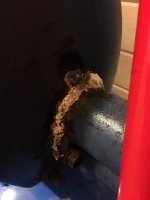Ok, pain in the ass situation!! about 2 months ago i notice some sputtering from the hot water taps in our cabin, well water with pressure tank and jet pump. I thought maybe our 10 year old hot water heater was going to crap out so I had it replaced with new 40 gal electric.
The sputtering is worse now than before. When we leave for the week and come is when it sputters for about 30 or so (any hot water tap) then its fine so long as are there using hot water, once we leave same problem again. This does NOT happen on the cold water side.
I have checked all lines under cabin and inside for leaks, none. I have tried running and bleeding all hot water taps at the same time to no avail. I obviously have air in the hot water side after the cabins sits for a few days . Air must be getting back in to the hot side but how????!! could it be the check valve on my pressure tank bleeding back?? but why wouldn't the cold water sputter too?
I thought maybe the tank temp was set to high and it was kinda high so I dialed it back to no avail. I've also checked for water in the pressure tank, seems fine, just air came out when I depressed the schrader valve
Local plumber is at a loss. Very irritating!!
ThoughtS
The sputtering is worse now than before. When we leave for the week and come is when it sputters for about 30 or so (any hot water tap) then its fine so long as are there using hot water, once we leave same problem again. This does NOT happen on the cold water side.
I have checked all lines under cabin and inside for leaks, none. I have tried running and bleeding all hot water taps at the same time to no avail. I obviously have air in the hot water side after the cabins sits for a few days . Air must be getting back in to the hot side but how????!! could it be the check valve on my pressure tank bleeding back?? but why wouldn't the cold water sputter too?
I thought maybe the tank temp was set to high and it was kinda high so I dialed it back to no avail. I've also checked for water in the pressure tank, seems fine, just air came out when I depressed the schrader valve
Local plumber is at a loss. Very irritating!!
ThoughtS

